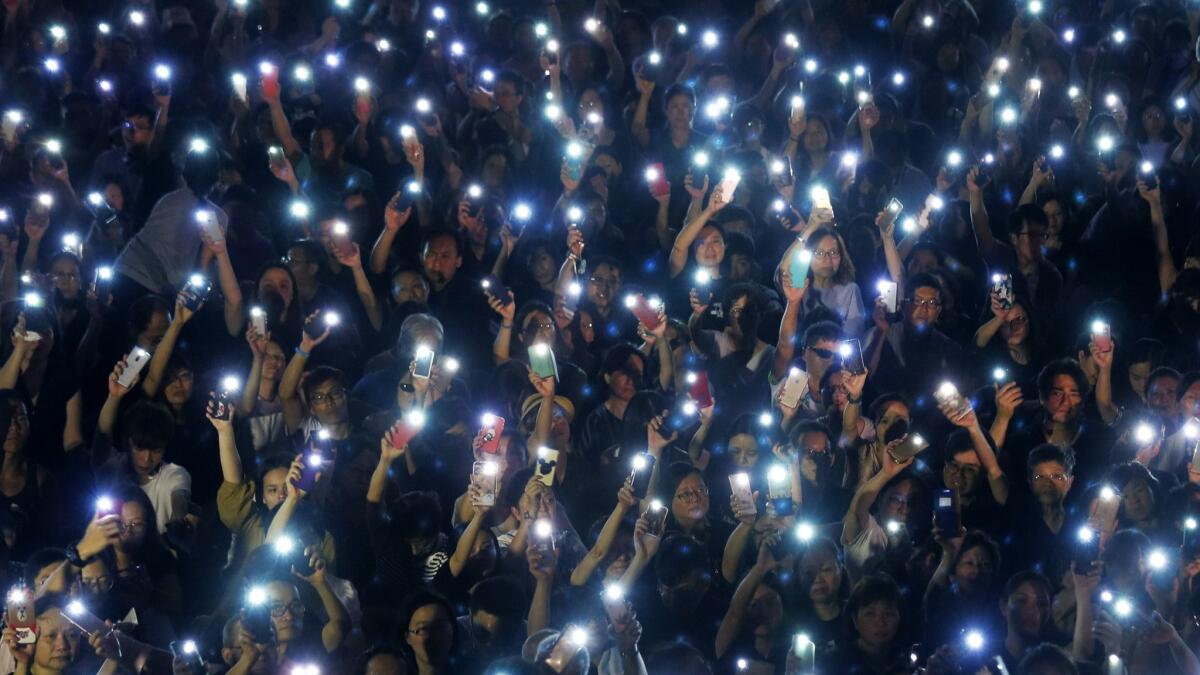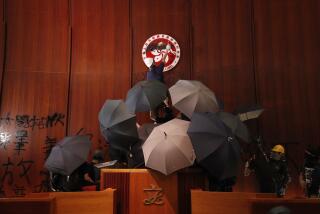In Hong Kong, one protester pulls off his mask and defines a movement
There were hundreds of protesters in the legislative chamber that night, but only one face.
Brian Leung Kai-ping had dressed carefully for the day’s protests against a Beijing-backed extradition bill, donning the new uniform of Hong Kong’s young activists: black T-shirt, yellow hard hat, goggles to protect against tear gas, and a disposable surgical mask. But after entering the Legislative Council building, watching as others spray-painted anti-government messages, Leung decided that anonymity could hurt the movement.
He jumped on a table and pulled off his mask.
“We are at the point of no return,” he cried, as everyone else in the room swerved to see his face, cameras clicking away.
Leung’s bold unmasking on Monday, the anniversary of Hong Kong’s handover from British to Chinese rule, looked dangerously impulsive. Even as Leung spoke, one of the other protesters tugged at his shirt, urging him to cover his face again.
But Leung said he had acted in full knowledge of the likely repercussions. It was a moment reflecting not a rash youngster’s rush of emotion, but the moral clarity of a generation that has come of age in a culture of dissent.
The protesters are demanding the scuttling of an extradition bill, now postponed, that would allow the semiautonomous territory to send suspected criminals to mainland China for trial.
For many in Hong Kong, the bill represents the growing influence of Beijing over Hong Kong, and the local government’s tepid response to a month of mass protests had pushed some into desperation.
Protesters wore masks to hide their identities as some smashed the legislative building’s glass walls and dismantled metal fences. Others tried to protect them, stopping onlookers from taking photos that might expose anyone’s face.
Hong Kong citizens had never taken over a government building like this. The movement had surged into uncharted territory, and this moment would decide whether they went down in history for creating damage or for their democratic demands.
First Hong Kong protested. Now it’s Wuhan, China. What makes it Beijing’s latest headache? »
Leung pleaded with fellow protesters to stay and occupy the chamber, or at least make a statement before dispersing. If no one stepped up to articulate the protesters’ demands, he thought, Beijing could define the swirl of anger and energy and vandalism however it wanted — likely as criminal riots. A month of peaceful protests, midnight vigils and million-person marches might be dismissed.
“Hong Kongers have nothing left to lose. Hong Kongers cannot lose any more,” he said.
As police approached, they drafted and read a list of demands including withdrawal of the extradition bill, investigation of alleged police violence and, in a reach toward deeper change, universal suffrage in Hong Kong.
Two days later, the arrests began. Authorities have so far rounded up dozens of protesters who took part in this summer’s pro-democracy movement, seen by Beijing as a direct challenge to its rule.
Leung has not been arrested so far, though he appears to be an easy target. He could face up to 10 years in prison, or even abduction and secret detention in China, as has happened to others in Hong Kong.
But he took the risk in order to claim his voice. In doing so, he reflected the heart of what protest means for many in Hong Kong: standing before terrifying power, and speaking clearly about who they are.

Leung is part of a generation born around the time Hong Kong was handed over from British to Chinese control in 1997.
He grew up reading Chinese books and celebrated Chinese holidays. In 2008, he cheered for the Beijing Olympics alongside many Hong Kongers who felt proud of their motherland’s new place on the global stage.
But that same year, 2008, writer and activist Liu Xiaobo was arrested for co-writing a manifesto on human rights in China. Tens of thousands of babies were hospitalized with kidney stones from ingesting contaminated milk powder.
Tens of thousands of people also died in an earthquake in Sichuan, including children in shoddily constructed schoolhouses, and when their parents protested, they were pressured to stop, some of them detained.
Mainland media censored most of these incidents, but in Hong Kong, where freedom of the press is protected by the special region’s semiautonomous legal system, teenagers were watching.
In 2010, Hong Kong’s government announced a coming change in school curriculums to adopt “Moral and National Education,” including material that praised China’s Communist Party and distorted historical narratives in the Chinese government’s favor.
Activist Joshua Wong, then 15, co-founded Scholarism, a student group dedicated to fighting the education reform. In 2012, the group occupied a park by the government headquarters and started a chain of hunger strikes.
Tens of thousands of civilians joined their demonstrations, and eventually the curriculum reform was withdrawn.
Leung said that was when he and many of his peers began to wrestle with questions of identity.
“It forced us to ask, are we Chinese or are we Hong Kongers?” Leung said in a telephone interview. “If we are really Chinese, why are we rejecting a curriculum that teaches us to assimilate to the Chinese race?”
He said rejection of Chinese identity was about political institutions, not culture.
“It’s very clear to Hong Kong people,” he said. “Do I have freedom to say things? Do I want to elect somebody to represent my will without being disqualified or jailed?”

By 2014, Leung was a university student and editor of the University of Hong Kong’s student union magazine, which became a space for him and his peers to build a Hong Kong-centric identity.
The magazine published an issue and later a book titled “Hong Kong Nationalism,” condemned by then-Chief Executive Leung Chun-ying, who said in a policy address that the book was “putting forward fallacies” and “advocating independence.”
The book became a best-seller. Leung’s union had to order thousands of extra copies to meet demand.
Then came the Umbrella Movement.
Tens of thousands of mostly young protesters occupied major roads in Hong Kong for 79 days, demanding direct election of the chief executive without having to pick from candidates approved by Beijing. Students held yellow umbrellas to fend off tear gas fired by police.
The movement’s demands were not met. Most of its leaders were arrested. Participants started new, youth-dominated political parties and elected their own legislators — only to have them disqualified for irreverent behavior in their oath-taking ceremonies.
Leung graduated and left Hong Kong, entering a doctorate program in political science at the University of Washington in Seattle. He wanted to study why authoritarianism is so resilient and how civil society can spur democratic transition.
When Leung saw the anti-extradition bill protests growing in June, he returned to Hong Kong. On the streets, he was surprised to find a new generation: teenagers more efficient and organized than his peers and speaking a “different language.”
They used pithy, emotional posts on Instagram and Snapchat instead of writing long essays on Facebook like Leung had done. They were decentralized and spontaneous, planning actions ad hoc from online forums rather than following a central leader.
Young Hong Kongers have lost patience with older generations’ hopes of waiting for slow change in China to trickle into Hong Kong, Leung said.
Critics may call them foolish, taking on an authoritarian superpower with spray-painted ideas. But he felt that if they didn’t act now, they might never have a chance again.
“Hong Kong people have put down their utilitarian, calculating mask,” Leung said. “We’re going to do what we believe is just and right.”
By the time he stepped into the legislative chamber on July 1, Leung had figured out what mattered most to him, which values he wanted for Hong Kong, how to fight for them and why.
He’d processed that with companions and classmates through years of marches and occupations. They’d read books and published journals, held candles and shared umbrellas, debated and discussed their beliefs and methods online and in person on the streets.
Masks muffle your voice, he thought. They obscure your identity. They let someone else define you, which is not how his generation works.
So he pulled off his mask.
ALSO:
Crackdown, arrests loom over Hong Kong as martyrdom becomes part of protest narratives
A new kind of Hong Kong activism emerges as protesters mobilize without any leaders
I watched the 1989 Tiananmen uprising. China has never been the same
More to Read
Start your day right
Sign up for Essential California for news, features and recommendations from the L.A. Times and beyond in your inbox six days a week.
You may occasionally receive promotional content from the Los Angeles Times.







